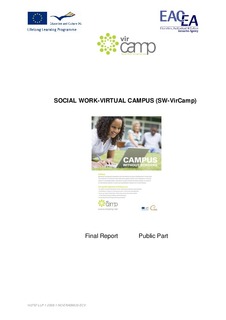| dc.contributor.author | Larsen, Anne Karin | |
| dc.date.accessioned | 2018-02-01T15:08:14Z | |
| dc.date.available | 2018-02-01T15:08:14Z | |
| dc.date.issued | 2010-11 | |
| dc.identifier.citation | http://vircamp.net/ep_tmp/files/6715045014cf62574630cc.pdf | en_US |
| dc.identifier.uri | http://hdl.handle.net/11250/2481743 | |
| dc.description | Project acronym:SW-VirCamp Sub-programme or KA:LLL-ERASMUS-EVC. Project coordinator:Anne Karin Larsen. Project coordinator organisation: Høgskolen i Bergen. Project website:http://www.vircamp.net. Promoteringsvideo "Promo Vircamp 2010": http://video.fabulaz.hib.no/public/video/id/525/tag | en_US |
| dc.description.abstract | This report aims to reach the educational sector and the field of Social Work, developers of e-learning courses and virtual campuses, as well as the evaluators of the project. The main objective for the Social Work – Virtual Campus (SW-VirCamp) project was to develop a virtual campus for Social Work in Europe that would offer students an international specialisation in Social Work. An e-learning course in Community Work was to be developed, with virtual learning material. It was also an objective to increase the digital competence among students as well as academic staff. Furthermore e-teaching competence and knowledge of creating virtual learning material and a competence-based curriculum plan was to be developed. The project was to benefit higher educational institutions (the project partners) and their staff, students, future social workers and their clients. Through the dissemination that was planned as a part of the project, researchers and professionals outside the consortium were also going to benefit from it. Twelve partners from nine European countries cooperated in the project. The teachers and researchers involved had diverse academic backgrounds, but were all connected to Social Work Education at their institutions. Media staff (with multimedia competence), management and administrative staff were also active in the project. A democratic and transparent approach characterised the project. All decisions were made in meetings. Minutes, plans and reports were presented at the project website. Ideas for the virtual learning material were developed in workshops, and screen lectures and triggers were later produced by some of the partner institutions. Data to be used in the project was collected through surveys and interviews, and after being analysed, reported back to the respondents. Promotional material was distributed among the stakeholders and numerous presentations of the objectives and results were made in various meetings and at important conferences. Throughout the project there was a process of both internal and external evaluation. The main result from the project is a sustainable virtual campus that offers in-depth international studies (in the application called international specialisation) to students. The virtual campus has been made sustainable through a consortium agreement that includes an administrative and financial model without external grants and support. To ensure both quality and sustainability, a comprehensive quality guide has been developed. An e-learning course in Community Work from an international perspective has been developed and a pilot course has been run. A Virtual Book with learning material for the course, including screen lectures, triggers and a virtual case, was produced for the course. A new web portal for the virtual campus has been developed and will be activated in the beginning of 2011. After the project period the main focus will be on the running and further development of the new virtual campus. New courses will be developed and the consortium will continue to work for a better integration of the courses in the institutional bachelor programmes. It is an aim to increase the number of partners in the consortium and to increase the number of qualified e-teachers. In the future the virtual campus will not only offer e-learning courses, but also practice placements as well as campus courses in English to promote the international exchange of students. The research cooperation between partners will continue and will build on existing cooperation and develop new research projects. The address to the project website and the coming web portal of the Social Work Virtual Campus is www.vircamp.net. At the website a promotional video of the virtual campus can be found. | en_US |
| dc.description.sponsorship | European Commission | en_US |
| dc.language.iso | eng | en_US |
| dc.relation.ispartofseries | Social Work – Virtual Campus | en_US |
| dc.relation.ispartofseries | 142767-LLP-1-2008-1-NO-ERASMUS-EVC, Grant Agreement 2008 - 3252 / 001 - 001 | en_US |
| dc.subject.other | social work | en_US |
| dc.subject.other | education | en_US |
| dc.subject.other | e-learning | en_US |
| dc.subject.other | virtual campus | en_US |
| dc.subject.other | europe | en_US |
| dc.subject.other | digital competence | en_US |
| dc.title | Social work-virtual campus (SW-VirCamp): Final report, public part | en_US |
| dc.type | Report | en_US |
| dc.subject.nsi | VDP::Samfunnsvitenskap: 200::Sosialt arbeid: 360 | en_US |
